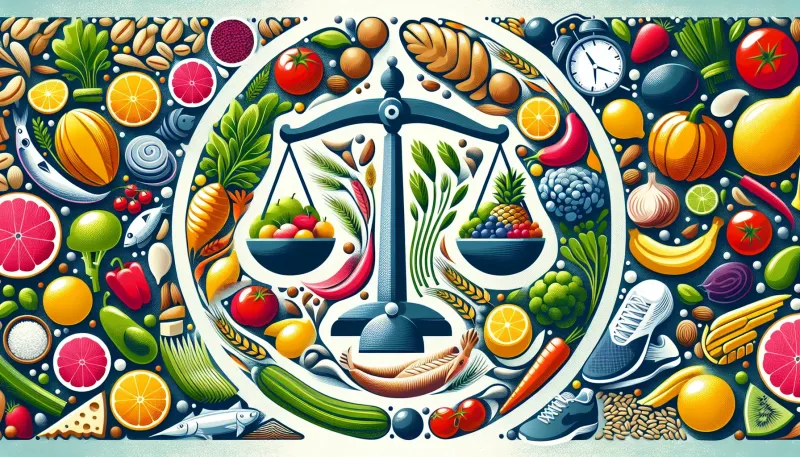The Ultimate Guide to Mediterranean Diet and Weight Management

Discover how the Mediterranean diet can help with weight management. Learn about its benefits, key components, and tips for successful implementation.
The Mediterranean diet has long been touted as one of the healthiest dietary patterns in the world. But what makes it special, and how can it help with weight management? This comprehensive guide explores the key components of the Mediterranean diet, its benefits for weight management, and tips for incorporating it into your lifestyle.
What is the Mediterranean Diet?
The Mediterranean diet is inspired by the traditional eating habits of people living in the Mediterranean region, including countries like Greece, Italy, and Spain. It emphasizes whole foods such as fruits, vegetables, whole grains, legumes, nuts, and olive oil, while limiting processed foods and red meat. Fish and poultry are preferred over red meat, and meals are often accompanied by a moderate amount of wine.
Key Components of the Mediterranean Diet
1. Fruits and Vegetables
Fruits and vegetables are at the heart of the Mediterranean diet. They are rich in essential vitamins, minerals, and antioxidants, which help promote overall health and prevent chronic diseases.
2. Whole Grains
Whole grains such as oats, barley, and whole wheat are staple foods in the Mediterranean diet. They provide sustained energy and are high in fiber, which aids in digestion and helps maintain a healthy weight.
3. Healthy Fats
Healthy fats, particularly from olive oil, are a cornerstone of the Mediterranean diet. Olive oil is a source of monounsaturated fats, which have been shown to improve heart health and reduce inflammation.
4. Lean Protein
Fish, poultry, and legumes are the main sources of protein in the Mediterranean diet. These proteins are lower in saturated fats compared to red meat, making them a healthier choice for weight management.
5. Moderate Wine Consumption
Moderate consumption of red wine is often included in the Mediterranean diet. Red wine contains resveratrol, an antioxidant that may protect the heart. However, it is important to consume alcohol in moderation as per individual health conditions and advised limits.
Benefits of the Mediterranean Diet for Weight Management
The Mediterranean diet can be incredibly effective for weight management due to several key factors:
1. Nutrient-Dense Foods
By focusing on whole, nutrient-dense foods, the Mediterranean diet naturally reduces calorie intake while providing the nutrients your body needs. This helps in maintaining a healthy weight without feeling deprived.
2. High Fiber Content
The high fiber content from fruits, vegetables, and whole grains helps you feel full longer, reducing the likelihood of overeating and helping with weight control.
3. Healthy Fats
Incorporating healthy fats from sources like olive oil and nuts helps to promote satiety, which plays a crucial role in managing weight.
4. Balanced Blood Sugar Levels
The Mediterranean diet's emphasis on low-glycemic foods helps to stabilize blood sugar levels, reducing cravings and the risk of developing type 2 diabetes.
5. Sustainable Lifestyle
Unlike many restrictive diets, the Mediterranean diet is sustainable and enjoyable, making it easier to maintain long-term weight management.
Tips for Incorporating the Mediterranean Diet into Your Lifestyle
1. Start Slowly
Begin by incorporating more fruits, vegetables, and whole grains into your meals. Gradually replace processed foods with healthier alternatives.
2. Replace Unhealthy Fats with Healthy Fats
Switch out butter or margarine for olive oil, and try to incorporate more nuts and seeds into your diet.
3. Choose Whole Grains
Opt for whole grain bread, pasta, and rice instead of their refined counterparts.
4. Eat More Fish
Try to include fish or seafood in your meals at least twice a week. Salmon, sardines, and mackerel are excellent choices.
5. Cook at Home
Preparing meals at home allows you to have better control over ingredients and portion sizes. Experiment with Mediterranean-inspired recipes to keep your meals exciting.
Conclusion
The Mediterranean diet is not just a diet but a way of life that promotes health and longevity. By focusing on nutrient-dense foods, healthy fats, and balanced meals, it provides a sustainable approach to weight management. Start by making small changes to your diet and gradually embrace the Mediterranean lifestyle for long-term benefits.
Remember, successful weight management is about consistency and making informed choices that align with your health goals. It’s advisable to consult with healthcare professionals before making significant changes to your diet, especially if you have underlying health conditions.



























